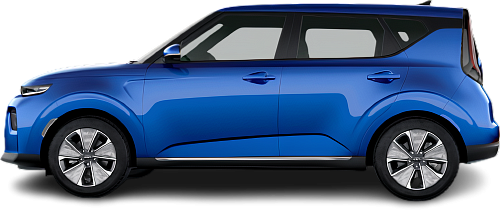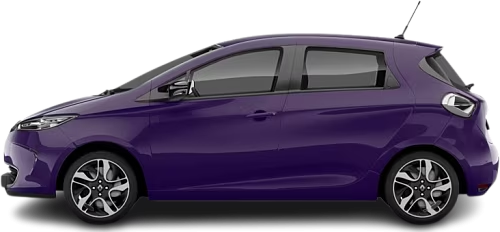USA EV Comparison: Kia Soul EV Standard Range vs Renault Zoe Z.E. 40 R90
Struggling to Decide? Let AI Help!
Your AI Summary Is Ready!
General Info
While the Kia Soul EV Standard Range (2020-…) is currently produced, it is not offered for sale in the United States. The Renault Zoe Z.E. 40 R90 (2016-2019) has been discontinued, it was never offered for sale in the United States.
The Kia Soul EV Standard Range (2020-…) is a SUV, whereas the Renault Zoe Z.E. 40 R90 (2016-2019) is a Hatchback.
| Property | Kia Soul EV Standard Range | Renault Zoe Z.E. 40 R90 |
|---|---|---|
| Years of Production | 2020-… | 2016-2019 |
| Current Status | Produced | Discontinued |
| Country of Manufacture | South Korea | France |
| Body Style | SUV | Hatchback |
| Market Availability | EU | EU |
| GCC Score | 5.1 | 5.3 |
Range and Efficiency
The Renault Zoe Z.E. 40 R90 (2016-2019) boasts a greater real-world range, a larger battery, and superior energy efficiency compared to the Kia Soul EV Standard Range (2020-…).
| Property | Kia Soul EV Standard Range | Renault Zoe Z.E. 40 R90 |
|---|---|---|
| Range (WLTP) | 171 mi | 197 mi |
| Range (GCC) | 146 mi | 178 mi |
| Battery Capacity (Nominal) | 42 kWh | 44.1 kWh |
| Battery Capacity (Usable) | 39.2 kWh | 41 kWh |
| Efficiency per 100 mi | 26.8 kWh/100 mi | 23 kWh/100 mi |
| Efficiency per kWh | 3.72 mi/kWh | 4.34 mi/kWh |
| Range and Efficiency Score | 5.4 | 6.6 |
Charging
Both vehicles utilize a standard 400-volt architecture.
The Renault Zoe Z.E. 40 R90 (2016-2019) has no DC fast charging capability, whereas the Kia Soul EV Standard Range (2020-…) can charge at up to 44 kW.
The Renault Zoe Z.E. 40 R90 (2016-2019) features a more powerful on-board charger, supporting a maximum AC charging power of 22 kW, whereas the Kia Soul EV Standard Range (2020-…) is limited to 7.2 kW.
| Property | Kia Soul EV Standard Range | Renault Zoe Z.E. 40 R90 |
|---|---|---|
| Max Charging Power (AC) | 7.2 kW | 22 kW |
| Max Charging Power (DC) | 44 kW | - Max Charging Power (DC) |
| Architecture | 400 V | 400 V |
| Charge Port | CCS Type 2 | Type 2 (Mennekes) |
| Charging Score | 4 | 6.1 |
Performance
Both vehicles are front-wheel drive.
The Kia Soul EV Standard Range (2020-…) boasts greater motor power and accelerates faster from 0 to 60 mph.
| Property | Kia Soul EV Standard Range | Renault Zoe Z.E. 40 R90 |
|---|---|---|
| Drive Type | FWD | FWD |
| Motor Type | PMSM | PMSM |
| Motor Power (kW) | 100 kW | 68 kW |
| Motor Power (hp) | 134 hp | 91 hp |
| Motor Torque | 291 lb-ft | 162 lb-ft |
| 0-60 mph | 9.5 s | 12.7 s |
| Top Speed | 97 mph | 84 mph |
| Performance Score | 3.1 | 1.7 |
Dimensions
The Kia Soul EV Standard Range (2020-…) is longer, wider, and taller.
Both models have similar wheelbase lengths.
| Property | Kia Soul EV Standard Range | Renault Zoe Z.E. 40 R90 |
|---|---|---|
| Length | 165.2 in | 160.8 in |
| Width (with Mirrors) | - Width (with Mirrors) | 76.6 in |
| Width (w/o Mirrors) | 70.9 in | 68.1 in |
| Height | 63.2 in | 61.5 in |
| Wheelbase | 102.4 in | 101.9 in |
Cargo and Towing
The Renault Zoe Z.E. 40 R90 (2016-2019) features a larger trunk, but the Kia Soul EV Standard Range (2020-…) offers greater maximum cargo capacity when the rear seats are folded.
Neither car is equipped with a frunk (front trunk).
Neither vehicle is officially rated for towing in the US.
| Property | Kia Soul EV Standard Range | Renault Zoe Z.E. 40 R90 |
|---|---|---|
| Number of Seats | 5 | 5 |
| Curb Weight | 3549 lb | 3263 lb |
| Cargo Volume (Trunk) | 11.1 ft3 | 11.9 ft3 |
| Cargo Volume (Max) | 47.3 ft3 | 43.3 ft3 |
| Cargo Volume (Frunk) | - Cargo Volume (Frunk) | - Cargo Volume (Frunk) |
| Towing Capacity | - Towing Capacity | - Towing Capacity |
| Cargo and Towing Score | 5.5 | 4.2 |




